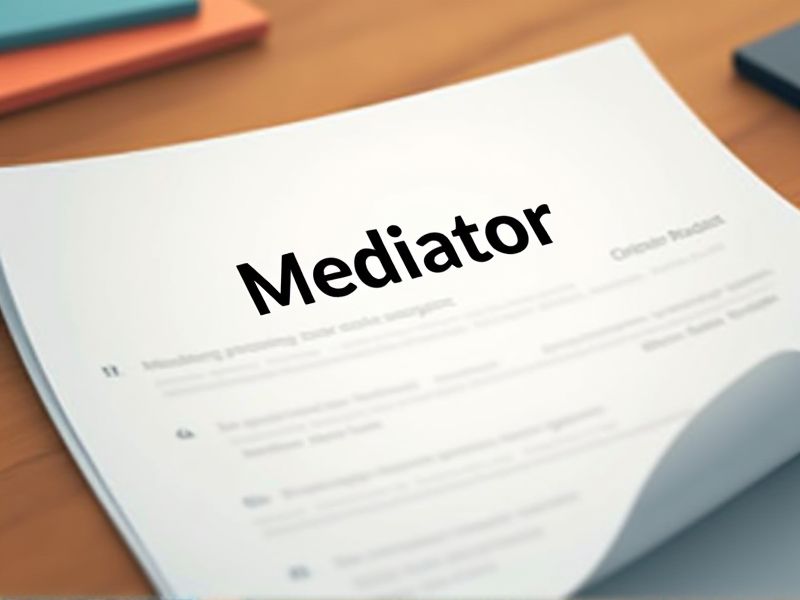
Mediators play a pivotal role in resolving conflicts and facilitating communication between parties, necessitating a solid foundation of skills and professionalism. Obtaining specific certifications ensures mediators are equipped with the necessary expertise and ethical understanding required in diverse and sensitive situations. Certification processes often encompass training in negotiation, communication techniques, and cultural competency, which are crucial for effective conflict resolution. Some important certifications you may need as a mediator include key credentials like the Certified Professional Mediator (CPM) and the Advanced Mediation Skills Certificate.
Certified Mediator (CM) Certification
Certified Mediator (CM) Certification establishes a standardized level of competence, ensuring mediators possess necessary skills and knowledge. It enhances credibility, making it easier for clients and organizations to trust the mediator's capabilities in resolving conflicts. The certification often leads to increased professional opportunities, as many institutions prefer or require certified individuals. The structured training and assessment involved in obtaining certification help mediators refine their techniques and stay updated with current best practices.
Advanced Mediation and Conflict Management Certification
The demand for an Advanced Mediation and Conflict Management Certification arises due to the growing complexity of disputes in today's diverse and interconnected world. Mediators equipped with this certification are more effective in navigating intricate legal, cultural, and emotional landscapes, enhancing outcomes for all parties involved. The certification provides mediators with advanced skills and strategies that increase their capability to de-escalate high-tension situations. This formal recognition of expertise often leads to increased credibility and trust among clients and stakeholders, expanding professional opportunities.
Family Mediation Certification
Family mediation certification ensures thorough understanding of conflict resolution techniques and relevant family laws, resulting in more effective mediation sessions. Certification equips mediators with essential skills to manage emotionally charged situations and foster constructive dialogue. In many regions, certification serves as a credential requirement, enhancing professional credibility and trust among clients. Through structured training, certified mediators are better prepared to address diverse family dynamics and facilitate fair agreements.
Court-Annexed Mediation Certification
Court-Annexed Mediation Certification ensures that mediators have met specific educational and training standards, leading to more effective conflict resolution in legal settings. Without certification, there is a risk of inconsistent mediation practices, potentially undermining the credibility of the process. Certified mediators are often better equipped to handle diverse legal disputes, which can lead to a higher rate of successful settlements. Courts can rely on certified mediators to uphold ethical standards, enhancing trust in the mediation process.
Alternative Dispute Resolution (ADR) Certification
Mediators with Alternative Dispute Resolution (ADR) Certification often possess enhanced skills and knowledge in conflict resolution, which increases their credibility among disputing parties. This certification frequently assures clients of the mediator's ability to facilitate fair and balanced negotiations. Many jurisdictions stipulate certification as a prerequisite for mediators to handle certain legal disputes, ensuring adherence to standard practices. Certification usually leads to greater professional opportunities and network access within the ADR community.
Collaborative Mediation Certification
Collaborative Mediation Certification enhances a mediator's credibility, establishing trust with clients by showcasing verified skills and adherence to recognized standards. This certification equips mediators with advanced conflict-resolution techniques, enabling them to handle complex disputes more effectively. Certified training expands a mediator's professional network, fostering opportunities for continued learning and referrals from peers. Regulatory bodies and institutions increasingly require certification, aligning mediators with evolving legal and procedural frameworks.
International Mediation Institute (IMI) Accreditation
The IMI Accreditation provides mediators with a globally recognized standard of quality and competence, increasing their credibility in international disputes. Mediators with IMI Accreditation often experience greater trust from clients due to the rigorous competency requirements assessed by peer reviews and performance evaluations. The accreditation helps in maintaining uniform standards across diverse legal systems, facilitating smoother transnational mediation processes. Demand for IMI-accredited mediators grows as businesses and individuals seek assurance of high ethical standards and professional competence.
Negotiation and Conflict Resolution Certification
Mediators often face complex disputes requiring effective problem-solving skills, and a Negotiation and Conflict Resolution Certification equips them with the necessary techniques. Without proper training, mediators might struggle to remain neutral, which can lead to biased outcomes. Certification provides a structured understanding of conflict dynamics, enabling mediators to facilitate discussions more efficiently. Having certified qualifications can increase a mediator's credibility and trustworthiness among clients and peers.
Conflict Management and Resolution Certification
Conflict Management and Resolution Certification equips mediators with essential skills to navigate complex disputes effectively. This certification enhances a mediator's credibility, often leading parties to place greater trust in their ability to facilitate fair negotiations. Specialized training provided through certification helps mediators understand diverse conflict scenarios and psychological dynamics, which can improve outcomes. Many jurisdictions and organizations require certified mediators to ensure a standardized level of competence and professionalism in their mediation services.
Mediation Training and Facilitation Certification
Mediation training provides essential skills for communication and conflict resolution, enabling mediators to navigate complex disputes effectively. Expertise developed through certification ensures adherence to ethical standards and best practices, enhancing the credibility of professionals in the field. Structured training introduces mediators to diverse case scenarios, equipping them with problem-solving strategies and techniques to address varied conflict contexts. Organizations and clients often seek certified mediators, valuing the assurance of competence and reliability in managing sensitive negotiations.
Summary
You will likely enhance your credibility by acquiring certifications as a Mediator. This increased trust from clients can lead to more engagement and referrals. You might also gain specialized skills that improve conflict resolution outcomes. Enhanced professional development could lead to better job opportunities and career growth.
